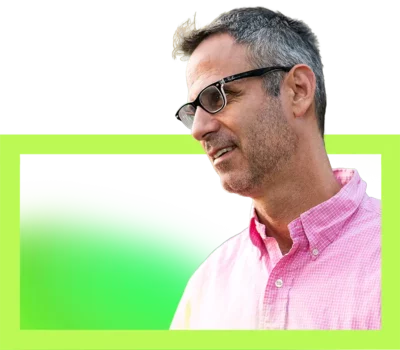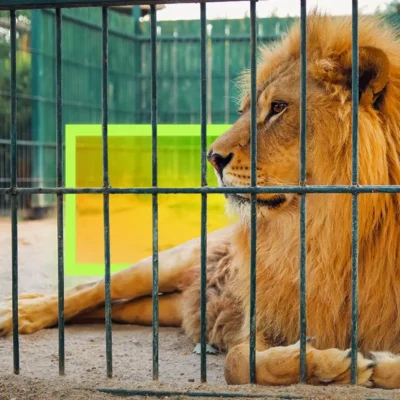My roads diverging
It happens not in a yellow wood, but in author Steve Almond’s befuddled 20s, when he is facing for the first time a decision that might actually matter. To the left lies success. To the right, something more interesting.


Table of Contents:
Transcript:
My roads diverging
STEVE ALMOND: One day, a thunderstorm descends from the north and releases spindles of lightning over the Franklins. Instantly, the desert turns from beige to a rich brown, and the creosote bushes explode their sweet, musky resin into the air. The slag heaps ringing the copper smelter take on the gleam of wet solder.
It occurs to me that I am starting to feel nostalgic about El Paso, a city I have lived in for less than a week and plan to leave forever by the weekend.
ROHAN GUNATILLAKE: I imagine Steve Almond is a favorite author for so many of you. His writing has a way of cracking open and celebrating our oddness, as George Saunders once put it. I love that. Steve’s also the longtime co-host of the relationships podcast Dear Sugars, and his books include the bestsellers Candyfreak and Against Football. His long-awaited debut novel, All the Secrets of the World, comes out in April. In fact, its roots actually trace back to the Meditative Story he’s sharing today.
In this series, we combine immersive first-person stories, breathtaking music, and mindfulness prompts so that we may see our lives reflected back to us in other people’s stories. And that can lead to improvements in our own inner lives.
From WaitWhat, this is Meditative Story. I’m Rohan, and I’ll be your guide.
The body relaxed. The body breathing. Your senses open. Your mind open. Meeting the world.
ALMOND: It’s the fall of 1988, and I’m freshly graduated from a liberal arts college with an English degree. My hair is styled in an un-ironic mullet, and my wardrobe is dominated by moth-eaten cardigans and pegged jeans. As promising as all this sounds, I have been unable to lock down a job in my chosen field: journalism.
I have sent my resume to every newspaper in New England and landed precisely one interview, at the Patriot Ledger in Quincy, Massachusetts. This is actually promising because The Patriot Ledger is what’s known as a feeder paper. A job there, I am told, will lead to a job at the Boston Globe and eventually the New York Times. Once I work at the New York Times, I will officially be a success, and my mother will stop worrying that I am going to die of scurvy.
I’m exaggerating, but only slightly. See, I come from a long line of strivers: doctors, lawyers, academics, rabbis. There are no writers in our lineage. So my decision to pursue a career in journalism, while freely undertaken, comes with an unspoken caveat: You better make good, boychik.
Thankfully, the editor at the Patriot Ledger says he sees something in me. Less thankfully, he doesn’t have a job to offer at the moment. So I fly home to California and move back in with my parents and send resumes out to the remaining daily newspapers in the United States while eating cold chicken in my underwear.
Two months later, I get a phone call from the features editor at the El Paso Times. The Times is a Gannett paper, meaning part of the chain whose flagship publication is USA Today. Serious journalists despise USA Today.
Then again, I am not yet a serious journalist. I am an unemployed English major living with his parents. When the features editor offers to fly me down for an interview, I dust off my thrift-store blazer and wing tips. Somewhat miraculously, I am hired.
This requires me to move to El Paso, which I still cannot find on a map, despite having spent two glamorous nights at the Downtown Radisson. So I head off to Triple A for maps and cram all my belongings into a newly-purchased-and-mightily-used Toyota Tercel, and I drive 20 hours straight.
By the time I reach the outskirts of El Paso, the lights along I-10 are pulsating. I pass a sign that reads:
El Paso: 11 miles
San Antonio: 592 miles
So that’s where I am.
The El Paso Times is – like El Paso itself – a strange amalgam. It reeks of burned coffee, with a persistent undercurrent of something delicious, what I will come to recognize as sautéed onions and chicharrones. About half the employees are Mexican-American, and they sometimes break into Spanish, which makes them sound 10 times happier than they sounded in English. The news editor looks and smells like an ashtray. He is perpetually leaning back in his seat, and when he bellows orders, which is a lot, the heels of his Tony Lama boots rattle the desktop.
A week after I arrive in El Paso, something amazing happens: the phone at my newsroom desk rings, and it’s the editor from the Patriot Ledger, calling to offer me a job. The whole situation feels very illicit, but apparently this is how things are done in the rough and tumble world of daily journalism.
Very softly, I accept his offer.
Now all I have to do is tell my boss, who hired me a week ago. She’s a short, nervous woman who collects kachina dolls and wears inordinate amounts of turquoise jewelry. I ask her if there’s somewhere we can talk privately, and she leads me to the vending machine room, where, in a tremulous voice, I tender my resignation.
She stares at me for a long time. She looks completely bewildered, as if I am a kachina doll with no face. Then, very gravely, she says the following: “If you quit this job, Steve, you will never ever work at USA Today.”
I tell her that I understand and head back to the newsroom to clean out my desk, though I have nothing in my desk to clean out.
My endocrine system, however, is in no way prepared for this decision. Almost immediately, I develop severe cramps. My appetite evaporates, and I cannot sleep. I don’t have any friends in El Paso, so the deputy news editor takes me out to breakfast, and I find myself weeping, inconsolably, over a plate of huevos rancheros. Tears land on my egg yolks and quiver, not quite poetically.
Clearly, I am having a nervous breakdown, though it will take me several years to figure this out. I have informed my parents that I am taking the job in Quincy, but I cannot bring myself to tell them that this decision has led to unremitting dread and multiple, unexplained crying jags.
Instead, late at night, I take my Tercel on long, insomniac wanderings into the Franklin Mountains, which loom above the city. I stop at the lookout point along Scenic Drive and stare down at the traffic lights below, which take the shape of a cross as they turn from red to green. This strikes me as terrifically important, a signifier of some kind. Then I start crying again.
One day, a thunderstorm descends from the north and releases spindles of lightning over the Franklins. Instantly, the desert turns from beige to a rich brown, and the creosote bushes explode their sweet, musky resin into the air. The slag heaps ringing the copper smelter take on the gleam of wet solder.
GUNATILLAKE: There is a lot of turbulence and turmoil here. Perhaps you can relate. Let’s do what we can to take this moment in the story to be grounded and steady. Take in a deep, four-count breadth that fills you. Hold it for three counts, and let it go – with a sigh if you wish – for four counts. Take your time.
ALMOND: It occurs to me that I am starting to feel nostalgic about El Paso, a city I have lived in for less than a week and plan to leave forever by the weekend.
Then again, I am doing none of the things that would be required for me to move across the country. I am not (for instance) packing up my stuff. Or hitting up Triple A for new maps. Or calling my ex-girlfriend to let her know I’m incoming. I’m just mooning around El Paso, clutching my stomach, and weeping over eggs.
A kinder (and more pretentious) way of putting it is that I am having an existential crisis. Two roads are diverging into the yellow woods – just like it said on the poster I used to stare at in my dad’s study – and the one I choose will make all the difference.
Because I am a sheltered and anxious 22-year old, it has not occurred to me that Robert Frost is not actually saying that my decision will make all the difference. In fact he’s saying something more nuanced, which is that we tend to want to see our decisions as daring and unconventional.
Nonetheless, I can’t help but feel that losing my mind is, in some inexorable way, shifting the trajectory of my life.
Because up to this point, I’ve been swept along by a pretty common current of ambition. I shipped off to a prestigious college, where I planned to major in Political Science and attend law school. I eventually mustered the nerve to pursue journalism. But even this was a hedge, as it allowed me to pursue writing from within a professional field.
This is why the job offer from the Patriot Ledger should be such a no-brainer. It’s a move into the orbit of the big East Coast papers, a step toward the power and respectability of serious journalism.
But whatever my brain might be saying, my body is saying the exact opposite. It’s saying, “Hey pal, stop being so obedient. It’s okay to make a decision that runs against the conventional wisdom. It’s okay to wander off the known map of coastal achievement. Go with the weirdness of this place.”
And my body is definitely not messing around. It is clearly going to torture me until I heed its advice.
So I do. After a week of tumult, I drive into the El Paso Times and beg the features editor for my job back. Then I call the editor at the Patriot Ledger and tell him that I cannot take the job he is offering me because it is against my principles, which is both laughable and convincing.
Instantly, within five seconds, my anxiety evaporates. Instantly, I am ravenous with hunger. Instantly, I am ready to sleep for 72 hours.
Within days, I have moved into my first adult apartment, a basement studio whose bathroom has no door. To celebrate, I buy the eight-piece dark meat special from Church’s Chicken.
El Paso turns out to be a fascinating place to live, especially for a white kid who grew up in the suburbs of Northern California. It’s a border city, separated from Juarez, Mexico by the Rio Grande. Every day, hundreds of people – mostly young women – make the soggy commute across the river to work for the day in El Paso, before walking back across one of the international bridges, to their families.
There are also tens of thousands of Mexicans (again, most of them young and female) who work at American-owned factories in Juarez called maquiladoras, where they assemble circuit boards or blue jeans for a wage Americans would consider inhumane.
Even at night, you can see the disparity: the Rio winds like a black snake between the bright yellow lights of El Paso and the faint, flickering blue lights of Juarez.
Eventually, I make friends with a colleague who grew up in Mexico. He takes me on long, terrifying, wrenchingly beautiful trips into the Sierra Madres.
GUNATILLAKE: The Sierra Madres. They may be mountains you know well or like me, not at all. Either way, let your mind flow into an imagination of what they are like. The colors, the views, the sense of space.
ALMOND: I do not write hard-hitting news stories. Instead, I write weird feature stories about the local lard factory and mad professors who hunt scorpions with ultra-violet lamps. I also take over as the paper’s music critic, which means that I get to review dozens of heavy metal and country bands that I have never heard of before.
Many years later, I’ll write about all this in a short story, but for now I’m just a young guy in an increasingly absurd mullet abusing adjectives for a living.
My point is that choosing to live in El Paso helps broaden my sense of the world. I can feel myself gradually slipping off the leash of anxious, middle-class expectation, straying from the predictable path of daily journalism into a stranger, more uncharted life.
Rather than moving on to the Dallas Morning News or the vaunted USA Today, my next job is at a weekly alternative paper in Miami, Florida. My editor there is a thoughtful depressive who encourages me to write longer, more literary stories, with actual characters and scenes.
It takes a few years, but at last I summon the courage to pursue a master’s degree in creative writing. My colleagues cannot fathom why I would do such a thing. “You mean you want to write books?” the executive editor asks me, perplexed and horrified.
He believes I’m squandering a promising career as a reporter. But it’s too late for me by then. I’ve begun reading novels and short stories. The questions posed by journalism – who, what, where, how – no longer feel like enough. I’m stuck on the essential question posed by literature: Why?
Why do people leave us? Why do we hurt the people we love? Why do we engineer our disasters? Why do we look for love in the wrong places? Or even this one: Why would a young gun who just got offered the job of his dreams suffer a nervous breakdown?
I’m not saying that my life would have been some desert of drudgery if I’d taken the gig in Quincy. I suspect I would have gotten sucked into the ambitions of the other young guns around me, and wound up with a good job at some reputable paper.
I certainly would have wound up with a steadier source of income and a lot fewer rejections, not to mention decent health insurance.
But I don’t know that I would have found my way to writing fiction if I hadn’t lost my religion, all those years ago, in El Paso. And in that sense, I really wouldn’t have found my calling.
I still think of the city as this beautiful, haunting locale where the first glimmerings of my artistic self emerged from the cocoon of my cosseted youth.
And the landscape has stayed with me for the past three decades. I know this because my debut novel – accepted for publication after 30 years of failed attempts – revolves around immigration and life on the Southern Border.
As I wrote the final pages, I could feel myself returning, instinctually, to the scene I’d witnessed a hundred times in El Paso: those young day maids crossing the Rio Grande at dawn and sneaking into the United States.
Sometimes, when I close my eyes and concentrate, I find myself back in El Paso. I can still feel the cool rain bursting from thunderheads, and smell the creosote. And though I can’t quite see myself at age 22, I know I’m there somewhere, unbearably young and lucky to be in the storm.
Rohan’s closing meditation
GUNATILLAKE: Like Steve, I think about those big junctions in my life a lot. I also think about the little ones. I have two good ideas of what to do with our closing meditation together, but I think I’ll go with the second one. I wonder what would have happened if I’d gone with the other one instead? Oh well, nevermind.
One of the moments I love from Steve’s story was how he talks about the questions posed by journalism and those posed by literature. How he starts in journalism, but moves to literature, to stories, because he wants a different kind of answer.
Let’s do a short meditation inspired by that idea. I’ve not really done anything like it before, so let’s have some fun with it too. And we’ll start with the first question of journalism.
What. Asking what? What is happening? Letting the question “What?” point your attention to what is happening in our experience right now. Maybe it’s a what in the body, a sensation or feeling? Maybe it’s a what in the mind – a thought or mood or vibe? Or maybe it’s a bit of both.
What. What is happening? What is happening? Asking this question is the heart of all mindfulness.
Where? Where? Where are you? Where is your attention? You can explore the question of “Where?” in that way if you like again now. Or, if you like, you can use “Where” to connect your awareness with your environment. To become aware of you as an entity in a space.
Asking the question “Where?” and exploring the answer
How? How do we know what is happening? This thing called awareness, consciousness. Irrespective of what is known, how are things known?
Who? Moving to the existential, as pointed by Steve’s story. If awareness is that which knows, then who are we?
And Steve’s final question, that which led him to literature: Why? What has led to this moment being how it is? Why is this moment like this? Curious about cause and effect. Seeing connections.
Five questions: What? What is happening? Where? Where are we? How? How do we know? Who? And why.
Keep those nearby and you’ll go pretty far in this meditation game.
Thank you Steve, and thank you. Till the next time.





